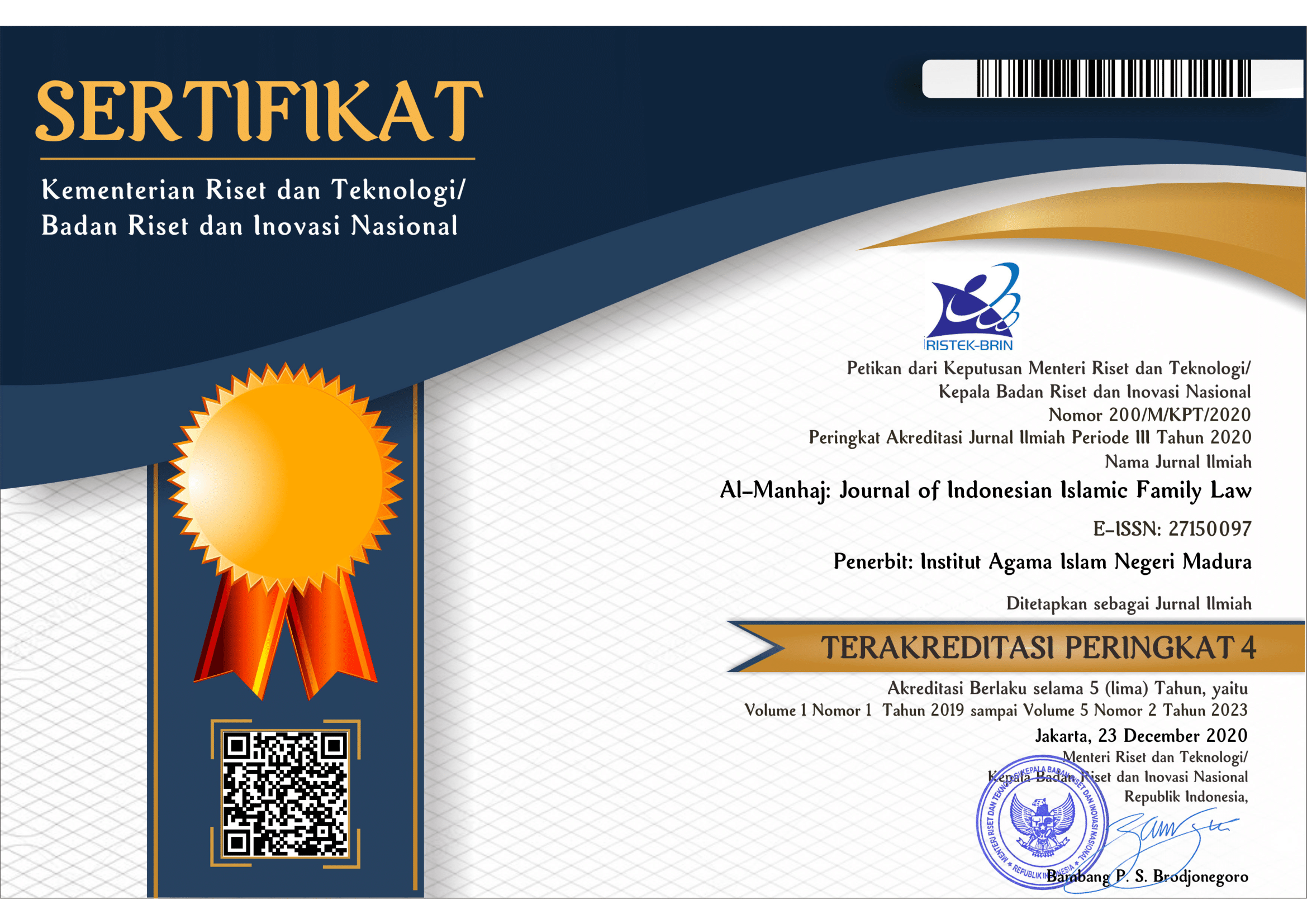Injustice Legal System Ibuism in Indonesian Marriage Law: A Study on Polygamy for Childlessness Reasons
 Abstract views: 232
,
Abstract views: 232
,
 PDF downloads: 304
PDF downloads: 304
Abstract
This research examines the inequality of justice for women in the regulation of polygamy in Indonesia, especially Article 4 paragraph (2) letter c of the Marriage Law and Article 57 letter c of the Compilation of Islamic Law which allows husbands to practice polygamy if the wife cannot produce offspring. This research uses a qualitative approach with a normative legal analysis method. The primary data sources of this research are the Marriage Law and the Compilation of Islamic Law. The secondary data sources are Court decisions, academic literature, journals, and expert opinions relevant to this research. The data analysis technique in this research uses the content analysis method. This research argues that there has been an inequality "Legal System Ibuism" in the polygamy permit policy of childlessness families in Indonesia. This research recommends legal reform in three aspects: legal structure (elimination of discriminatory policies by the executive, legislative and judiciary), legal substance (revision of polygamy rules in Article 4 paragraph 2 letter c of the Marriage Law and Article 57 letter c of the Compilation of Islamic Law), and legal culture (changing society's views on the role of women in marriage). As a solution, alternatives such as adoption, foster parents, and reproductive technology can be prioritised over polygamy. With these reforms, the legal system can be more just and inclusive for women.
Downloads
References
Abu Hamid Al Ghazali. Ihya’ ‘Ulum al-Din. Beirut: Dar al-Ma’rifah, 1997.
Afandi, Moh, Ahmad Agus Ramdlany, Nilna Fauza, Siti Khoirotul Ula, and Mohammad Farah Ubaidillah. “Authority, Culture, and Sexuality in the Polygamy of Madurese Ulamas.” Ahkam: Jurnal Ilmu Syariah 24, no. 1 (2024): 1–16. https://doi.org/10.15408/ajis.v24i1.36237.
Ambarayadi, Bian, and Andi Molawaliada Patodongi. “Keluarga Poligami Dalam Negara-Negara Islam.” As-Syar’i: Jurnal Bimbingan & Konseling Keluarga 6, no. 2 (2024). https://doi.org/10.47476/assyari.v6i2.6663.
Andra Nugraha, and Ali Akbar. “Analisis Pertimbangan Hakim Di Pengadilan Agama Mungkid Terkait Tidak Diterimanya Izin Poligami Yang Terpenuhinya Syarat Kumulatif (No.296/Pdt.G/2021/PA.Mkd).” BUSTANUL FUQAHA: Jurnal Bidang Hukum Islam 6, no. 1 (April 23, 2025): 208–23. https://doi.org/10.36701/bustanul.v6i1.2063.
Ansori, Lutfil. “Reformasi Penegakan Hukum Perspektif Hukum Progresif.” Jurnal Yuridis 4, no. 2 (n.d.): 148–63.
Azizi, Marzieh, Fereshteh Yazdani, Roya Nikbakht, and Zohreh Shahhosseini. “The Biopsychosocial Outcomes of Childlessness or Having One Child on Couple’s Health: A Systematic Review.” Journal of Pediatrics Review 13, no. 1 (January 1, 2025): 17–28. https://doi.org/10.32598/jpr.13.1.902.3.
Badan Pusat Statistik. “Jumlah Perceraian Menurut Provinsi Dan Faktor Tahun 2023.” Badan Pusat Statistik, 2024.
Betty Friedan. The Feminine Mystique. United States of America: Vail-Ballou Press, 1963.
Deva Yulinda, and Suci Ramadhani Putri. “Stereotip Ibu Rumah Tangga Sebagai Perempuan Pengangguran (Studi Kasus Dinas Kependudukan Dan Catatan Sipil Kabupaten Lombok Utara).” Al-Manhaj: Journal of Indonesian Islamic Family Law 5, no. 1 (June 30, 2023): 83–98. https://doi.org/10.19105/al-manhaj.v5i1.7920.
Dewi Ulfa Lailatul Fitria, and Fitri Ariani. “Problematika Poligami Di Negara Turki,” n.d. http://kbbi.web.id//gun-dik/.
Fakhyadi, Defel, Sekolah Tinggi, Agama Islam Negeri, and Mandailing Natal. “KRIMINALITAS PRAKTIK NIKAH SIRI DAN POLIGAMI DI INDONESIA,” n.d.
Fatimatuzzahro, and Fifi Nofiaturrahmah. “Poligami Dalam Hukum Islam Kontemporer: Memahami Poligami Dengan Pendekatan Interkonetif,” n.d.
Febrianty, Yenny, Hidayati Fitri, Masna Yunita, Esti Royani, Kevin M. Rivera, and Viorizza Suciani Putri. “Answering the Challenges of Polygamy: Justice and Legal Protection in Islamic and Indonesian Law.” Jurnal Ilmiah Mizani: Wacana Hukum, Ekonomi Dan Keagamaan 12, no. 1 (April 14, 2025): 15. https://doi.org/10.29300/mzn.v12i1.6930.
Galieva, Guzel Ilgizovna. “Polygamy As a Form of Marriage: Based on Sociological Research.” KnE Social Sciences, January 21, 2021. https://doi.org/10.18502/kss.v5i2.8397.
Gouni, Olga, Gabija Jarašiūnaitė-Fedosejeva, Burcu Kömürcü Akik, Annaleena Holopainen, and Jean Calleja-Agius. “Childlessness: Concept Analysis.” International Journal of Environmental Research and Public Health 19, no. 3 (February 1, 2022). https://doi.org/10.3390/ijerph19031464.
Izomiddin. Pemikiran Dan Filsafat Hukum Islam. Jakarta: Kencana, 2018.
Jumarim. “The Practice of Adoption in the Sasak Community and Its Implications for Marriage Law in Indonesia.” Samarah 8, no. 1 (March 1, 2024): 445–67. https://doi.org/10.22373/sjhk.v8i1.18581.
Kalmijn, Matthijs, Suzanne G. de Leeuw, Maaike Hornstra, Katya Ivanova, Ruben van Gaalen, and Kirsten van Houdt. “Family Complexity into Adulthood: The Central Role of Mothers in Shaping Intergenerational Ties.” American Sociological Review 84, no. 5 (October 1, 2019): 876–904. https://doi.org/10.1177/0003122419871959.
Kartika, Ni Komang, and I Gusti Ayu Diah Fridari. “Dampak Involuntary Childlessness Pada Perempuan Dan Laki-Laki Di Indonesia: Kajian Literatur.” Jurnal Ilmiah Ilmu Sosial 10, no. 1 (June 26, 2024): 01–15. https://doi.org/10.23887/jiis.v10i1.73369.
Lawrence M. Friedman. Sistem Hukum Perspektif Ilmu Sosial. Edited by M. Khozim. Bandung: Nusa Media, 2009.
Margaret Ogbanga, Mina, and Triumph Onyononwi. “The Silent Struggle: Unpacking Social Perceptions of Childlessness among Married Couples THINK INDIA JOURNAL The Silent Struggle: Unpacking Social Perceptions of Childlessness among Married Couples,” n.d. https://www.researchgate.net/publication/385553134.
Melinda Aprilyanti, and Erik Sabti Rahmawati. “Childfree Dalam Pandangan Abu Hamid Al-Ghazali Nur Rofiah.” Sakina: Journal of Family Studies, no. 595 (2022): 1–4. https://doi.org/10.3917/POPSOC.595.0001.
Mufliha Wijayati. “Family Law Reform In Tunisia(Reading the Rules of Polygamy in The Tunisian Code of Personal Status 1957) POLIGAMI.” Jurnal Ilmiah MIZANI 1, no. 8 (July 1, 2021): 215–29. https://doi.org/10.31958/juris.v19i2.2429.
Muzzakir, Muzzakir, M. Anzaikhan, and Fouza Azwir Abdul Azis. “Polygamy and Child Adoption in Islamic Law: A Comparative Study of Thought Quraish Shihab and Zakir Nai.” Al-Qadha : Jurnal Hukum Islam Dan Perundang-Undangan 11, no. 1 (August 28, 2024): 144–57. https://doi.org/10.32505/qadha.v11i1.9267.
Nanda Dwi Rizkia, and Hardi Fardiansyah. Metode Penelitian Hukum (Normatif Dan Empiris). Edited by Elan Jaelani. Bandung: Widina Media Utama, 2023.
Naseer, Sabila, Sehrish Farooq, and Farah Malik. “Causes And Consequences Of Polygamy: An Understanding Of Coping Strategies By Co-Wives In Polygamous Marriage.” Asean Journal of Psychiatry 22, no. 9 (2021). https://doi.org/10.54615/2231-7805.47221.
Nur Rofiah. Nalar Kritis Muslimah. Vol. 2020. Bandung: Afkaruna, n.d.
Nurul Fadila, Salma, Nina Nursari, Oyo Sunaryo Mukhlas, and Uin Sunan Gunung Djati Bandung. “Dinamika Politik Hukum Poligami Dalam Undang-Undang Perkawinan: Tantangan Dan Implikasinya Terhadap Sistem Hukum Indonesia.” Jurnal Ilmu Hukum 1, no. 2 (n.d.): 3063–5403. https://doi.org/10.31004/innovative.v4i1.8080.
Olugbami, Godwin. “The Masculine Perspective of the Stigmatization of Childlessness in Marriage in Yorùbáland: An Ile-Ife Phenomenological Study,” 2024.
Putri, Suci Ramadhani. “Child Protection Affected by the Covid-19 in Indonesia: Islamic Perspective.” Al Hurriyah : Jurnal Hukum Islam 7, no. 1 (July 12, 2022): 47. https://doi.org/10.30983/alhurriyah.v7i1.5319.
Putri, Suci Ramadhani, Deva Yulinda, Weis Arqurnain, Islam Negeri Mataram, Universitas Islam, Negeri Sunan, and Ampel Surabaya. “Poligami Indonesia Dan Maladewa: Sebuah Perbandingan Atas Keberanjakan Hukum Keluarga Islam,” n.d.
Rozali, Yuli Asmi. “Penggunaan Analisis Konten Dan Analisis Tematik.” Penggunaan Analisis Konten Dan Analisis Tematik Forum Ilmiah. Vol. 19, 2022. www.researchgate.net.
Sam’ani, Samani, Rokhmadi Rokhmadi, Nasihun Amin, Ahmad Zaini, and Suprijati Sarib. “Pragmatism of Polygamous Family In Muslim Society: Beyond Islamic Law.” Samarah 7, no. 1 (2023): 321–40. https://doi.org/10.22373/sjhk.v7i1.15874.
Senim, Sümeyya, and Sidar Gül. “Gönülsüz Çocuksuzluk: Kadın İnfertilitesi ve Damgalanma Involuntary Chıldlessness: Female Infertılıty And Stıgma.” MAUNSagBil.Derg. Vol. 4, 2024.
Shalehatun Nisa, Nurulia, Maulana Umar Inamul Hasan, and Arum Al Fakih. “Menyoroti Poligami Bagi Pns Dalam Kajian Perundang-Undangan Hukum Keluarga Islam,” n.d.
Shelvy Susanti, and Nurchayati. “Menikah Tanpa Keturunan: Masalah Psikologis Yang Dialami Perempuan Menikah Tanpa Anak Dan Strategi Coping Dalam Mengatasinya 1 Menikah Tanpa Keturunan: Masalah Psikologis Yang Dialami Perempuan Menikah Tanpa Anak Dan Strategi Coping Dalam Mengatasinya,” n.d.
Solikin, Nur, and Moh Wasik. “The Construction Of Family Law In The Compilation Of Islamic Law In Indonesia: A Review of John Rawls’s Concept of Justice and Jasser Auda’s Maqashid al-Shari’a.” Ulumuna 27, no. 1 (June 12, 2023): 315–40. https://doi.org/10.20414/ujis.v27i1.708.
World Health Organization. “Infertility.” World Health Organization, 2024.
———. Infertility Prevalance Estimates, 2022.
———. “Infertility Prevalence Estimates, 1990–2021.” World Health Organization, April 3, 2023.
Zuhriah, Erfaniah, Erik Sabti Rahmawati, Melinda Aprilyanti, Umi Chaidaroh, and Mufidah Ch. “Childfree, the Digital Era, and Islamic Law: Views of Nahdlatul Ulama, Muhammadiyah, and Gender Activists in Malang, Indonesia.” Samarah 7, no. 3 (November 1, 2023): 1606–26. https://doi.org/10.22373/sjhk.v7i3.17753.
Copyright (c) 2025 Al-Manhaj: Journal of Indonesian Islamic Family Law

This work is licensed under a Creative Commons Attribution-ShareAlike 4.0 International License.















